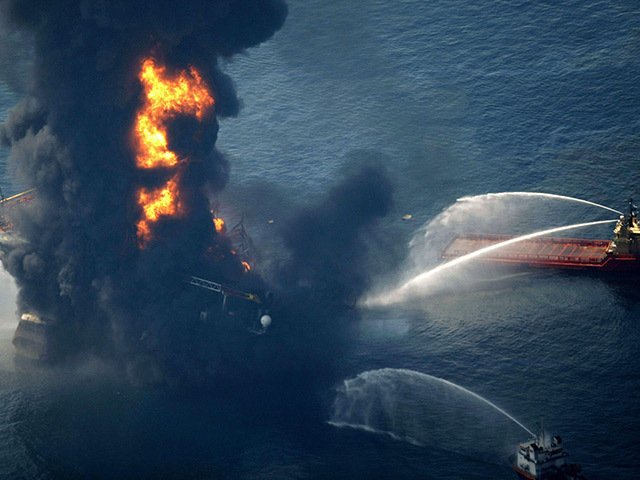
Perhaps the only thing more egregious than the prosecution of former BP engineer Kurt Mix was the way that prosecution ended: with a whimper so barely audible you may have missed it.
Mix was the first person to face criminal charges related to the 2010 Deepwater Horizon disaster, yet he had nothing to do with the disaster itself. His alleged crimes came amid his efforts to help cap the ruptured well in the frantic days after the blowout.
Soon after the Mix prosecution imploded, the U.S. government also folded its other remaining criminal cases related to the disaster, dropping manslaughter charges against Donald Vidrine and Robert Kaluza, the BP company men on the doomed rig. Prosecutors had claimed that Vidrine and Kaluza made decisions that led to the deaths of 11 crewmen.
Mix’s case always felt as if prosecutors were punishing, on a legal technicality, someone who was trying to help. As for Vidrine and Kaluza, they may have made bad, even fatal, decisions, but they didn’t do so recklessly, and they didn’t deviate from corporate policy.
It was, after all, BP’s culture that was both reckless and culpable in the Deepwater Horizon disaster.
In finding BP grossly negligent in the accident last year, U.S. District Judge Carl Barbier in Louisiana implied that Vidrine, in particular, was to blame for his role in the disaster because he misinterpreted the results of a negative pressure test hours before the blowout.
“If the negative pressure test had been correctly interpreted, the blowout, explosion, fire, and oil spill would have been averted,” Barbier wrote. “Consequently, the Court finds that the misinterpretation of the negative pressure test was a substantial cause of the blowout, explosion, fire, and oil spill.”
As an agent of BP, Vidrine’s actions became evidence of the company’s negligence. The criminal case against Vidrine and Kaluza, however, attempted to turn the argument on its head – that as agents of a negligent culture, the two men engaged in criminality. The logic, however, doesn’t work in reverse.
Vidrine may have handled the pressure test poorly, and that decision may have played a significant role in the disaster, but his decision didn’t occur in isolation. Any mistake by Vidrine was merely the last in a series of bad decisions that culminated in the disaster. Some of those decisions came months before the blowout, and were made by BP engineers and supervisors who were in charge of the well’s design.
Vidrine, according to what he told BP’s investigators after the accident, made a phone call from the rig to a supervisor in Houston to discuss the pressure test, implying that the decision to proceed was not his alone. In other words, BP’s culture of negligence that led to the disaster is not evidence that Vidrine or Kaluza committed a crime as individuals.
They did, supposedly, have the authority to shut down the rig if they believed danger was imminent, but most offshore workers will tell that work stoppage authority is rarely invoked on the drilling floor.
Mix, meanwhile, was accused to deleting two strings of text messages that the government claimed cast doubt on the rate of oil flowing from the fractured wellhead a mile below the surface of the Gulf of Mexico. BP had, of course, downplayed the amount of oil spewing from the well. The government believed Mix’s messages showed that people within BP knew that the flow rate was much greater than the company was publicly admitting at the time.
It’s not clear how the government figured out Mix had deleted the messages, but federal prosecutors already had the information – in fact they had the very same messages, which had previously been turned over to them.
At the time they pursued these cases, the feds clearly wanted to bring criminal charges against somebody. They wound up with weak cases against people who may have made bad decisions but did not commit crimes.
If the charges had been upheld, Mix could have spent 20 years in prison. Vidrine and Kaluza originally faced 199 years each.
Realizing their cases wouldn’t hold up, the feds offered all three men an out. They could avoid jail time by pleading guilty to misdemeanor charges – some probation, some community service and some modest fines. Never mind the cost and disruption the ill-conceived prosecutions brought to the men and their families. Mix and Vidrine took the deals. Kaluza has vowed to keep fighting.
As a result, three years after it first brought its criminal case against BP, Vidrine and Kaluza, the feds have no convictions. The only other person charged, former BP vice president David Rainey, was acquitted in June of charges he knowingly underestimated the amount of oil spewing from the ruptured well after the blowout.
BP itself has accepted criminal responsibility for the Deepwater Horizon disaster, pleading guilty to felonies and agreeing to pay $4.5 billion, the largest criminal penalty ever levied by the Justice Department.
The lack of jail time is upsetting for the families of the men killed, which is understandable. Too frequently, when lives are lost in preventable industrial accidents, blame and accountability become elusive, diffused by the fog of corporate bureaucracy.
But prosecuting those who were following flawed procedures or those were trying to help correct the mistake won’t bring back the dead, nor will it help prevent future disasters. In fact, as Mix noted in a recent Wall Street Journal oped, it may actually discourage other workers from doing the right thing in future disasters. Ultimately, wrongful prosecution only creates more victims.
Loren Steffy is a managing director with the communications firm 30 Point Strategies. He is a writer at large for Texas Monthly and the author of Drowning in Oil: BP and the Reckless Pursuit of Profit and The Man Who Thought Like a Ship. Follow him on Twitter: @lsteffy; on Facebook or at lorensteffy.com.